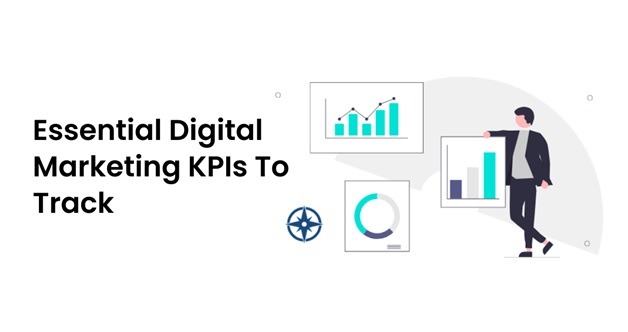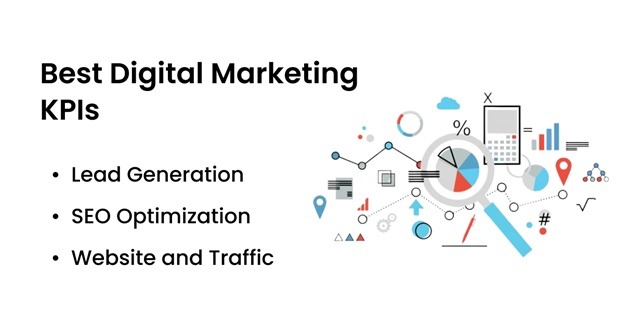Whether it is a marketing strategy or managing your core business operations, tracking is the key to measuring results and knowing if your strategy is working or not. When it comes to digital marketing, creating a stunning strategy is essential. However, you must use specific metrics to help you measure the success of your campaigns. Several digital marketers use different digital marketing KPIs to facilitate proper decision-making and navigate your marketing data to get better results.


KPIs are Key Performance Indicators that work as a measurable value to calculate the success of your marketing campaigns. If you are a digital marketer or want to hire remote developer, here are the top digital marketing KPIs you can use to track your success.
What Are Marketing KPIs?
As stated above, Key Performance Indicators are measurable values that help marketers from an offshore development center to measure their success in the digital campaigns they follow. The most popular KPIs are Cost Per Lead (CPL), Cost Per Acquisition (CPA), Marketing Qualified Leads (MQL) and Website Visits according to marketing channels.
To select the right marketing tools and build a stunning strategy, you must start by picking these metrics.
The best marketing KPIs are divided into three categories:
- Lead Generation
- SEO Optimization
- Website and Traffic
Here are the top KPIs belonging to the categories listed above:


1. Lead Generation
To ensure that lead generation tactics are paying off, outsourced employees from an offshore development center can use the below KPIs to track success.
Monthly New Leads
Monthly new leads are the most popular KPI used by digital marketers to calculate the number of new leads received in the past month.
You can measure the leads by using management software and applying various filters to get a customized list during a specific period of time. To get more leads, work on SEO-content optimization, increase the budget of cost-per-click ad campaigns and offer discount offers to your customers.
Qualified Leads Per Month
In addition to calculating the total number of leads received, you must also calculate the number of qualified leads to ensure that you are using a proper marketing strategy.
Leads or prospects who have chances of becoming your customer can be divided into the following three categories:
Marketing Qualified Leads (MQL): This includes the leads the marketing team decided to move forward with.
Sale Accepted Leads (SAL): This category includes the leads that have been accepted by the sales team.
Sales Qualified Leads (SQL): This category includes the leads of prospective customers.
Qualified leads per month can be measured by using various CRM software. You can also create specific marketing campaigns to target a particular audience.
Cost per lead generated
CPL represents the cost of getting new leads. If you use this metric with the cost-per-conversion metric, you can find out if a certain marketing activity is profitable or not.
To calculate this cost, you must sum up the time and money spent on marketing and resources and then compare the result with monthly leads. To lower your cost, you can use free campaigns or use an outstanding social media marketing strategy to divert the audience to the website.
Cost per conversion
This indicates the cost of acquiring a lead that actually converted into a customer. You must understand that a marketing strategy like advertising your services can generate hundreds of leads; however, only 2% are actually genuine. Meaning, only 2 out of a hundred leads actually convert into paying customers. Also, if the customer lifetime value is higher than the cost-per-conversion, you are wasting your money, efforts and resources on that digital marketing strategy.
Generally, leads can take up to 2 months to convert into paying customers. You can use this metric in the gap of two months to track lead conversion. To measure the conversion rate, calculate the monthly cost and effort for your lead acquisition projects. You can then use CRM tools to figure out how many leads are converted. Divide the total monthly cost by the number of conversions to see how much you are spending to acquire a new customer. You can hire CRM experts from an offshore development center.
Another thing to keep in mind; when you are generating leads through a PPC campaign, calculate cost-per-conversion and not cost-per-click, vanity metrics or impressions.
Average conversion time
The more your leads take time to convert, the more you need to work on your digital marketing strategy. Having a higher conversion time will make the potential customers lose interest in your services and look for different alternatives.
The average time can be calculated by visiting your customer base and figuring out how much your leads took to convert into actual paying customers. You can also use several CRM tools to calculate the same.
To decrease the average time for lead conversion, you can offer limited offer discounts and make the buying process easy.
2. Website & Traffic
Monthly website traffic
You can use analytical tools like Google Analytics to calculate the website generated on the whole website, homepage, pricing page, blog page, landing pages etc. The crux here is to calculate the website for each page individually to find out which page is working well and what pages need more work.
You can improve the website traffic by spending more on cost-per-click strategies or publishing SEO-optimized content on the website.
New vs returning visitors
If you want to keep the engagement rising, make sure the number of returning customers is more than the new visitors. If this is not true, you must work on the website’s content to ensure proper engagement.
Average time on page
If your main aim is generating organic traffic, this metric is perhaps the most important KPI to track. The higher visitors spend time on your website, the better your website will be ranked.
To improve average time, you can publish compelling content, add more information to the pages and add a unique layout to the landing pages. You can hire remote developer for this requirement.
3. Search Engine Optimization
Inbound links to a website
Inbound links refer to whether your content has been shared on different websites. It can also help you calculate your expertise in your field. To get started, measure the quality of links on your website, especially on the pages with a higher ranking.
To see all inbound links to your website, you can use SEO tools like SEMrush or Moz. Inbound links increase with reputation. So, work on your brand’s reputation. Publish compelling content that represents your expertise in a specific field.
New Leads Through Organic Search
You can use this KPI to calculate the new leads generated from organic research. It can also help you assess the quality of organic search and leads. To measure this KPI, you can use a marketing analytics tool. To improve the number of new leads generated from organic search, use targeted keywords and create an SEO strategy, paying close attention to keyword-optimized content generation.
Google PageRank
Based on the quality and quantity of the inbound links, you can use this KPI to calculate the rank of your website on Google. To increase the ranking, you can increase the number of inbound links through guest postings or pitching your services to a journalist.
You can also improve your reach by fixing any broken links on your website or publishing quality content that your audience might like or share.
Hire Remote Developer With GraffersID
Having a website with engaging content and well-placed elements is the key to success. You can make this possible by hiring experts by getting in touch with us.
We at GraffersID, serve as an offshore development center that connects you with Indian professionals who have extensive industry experience in website development, software development and creating compelling strategies for your website’s success. Get in touch with us today to hire right.








